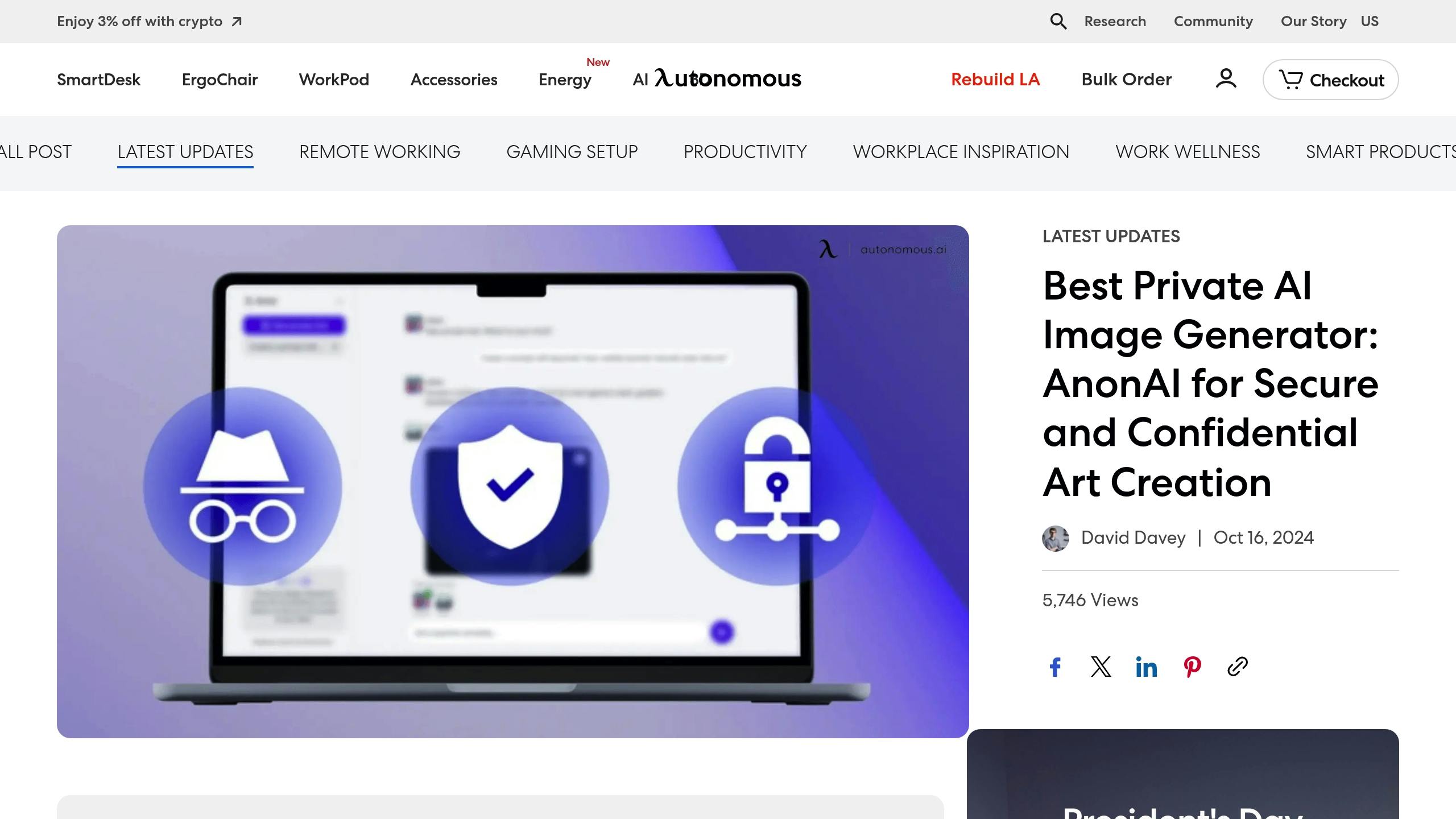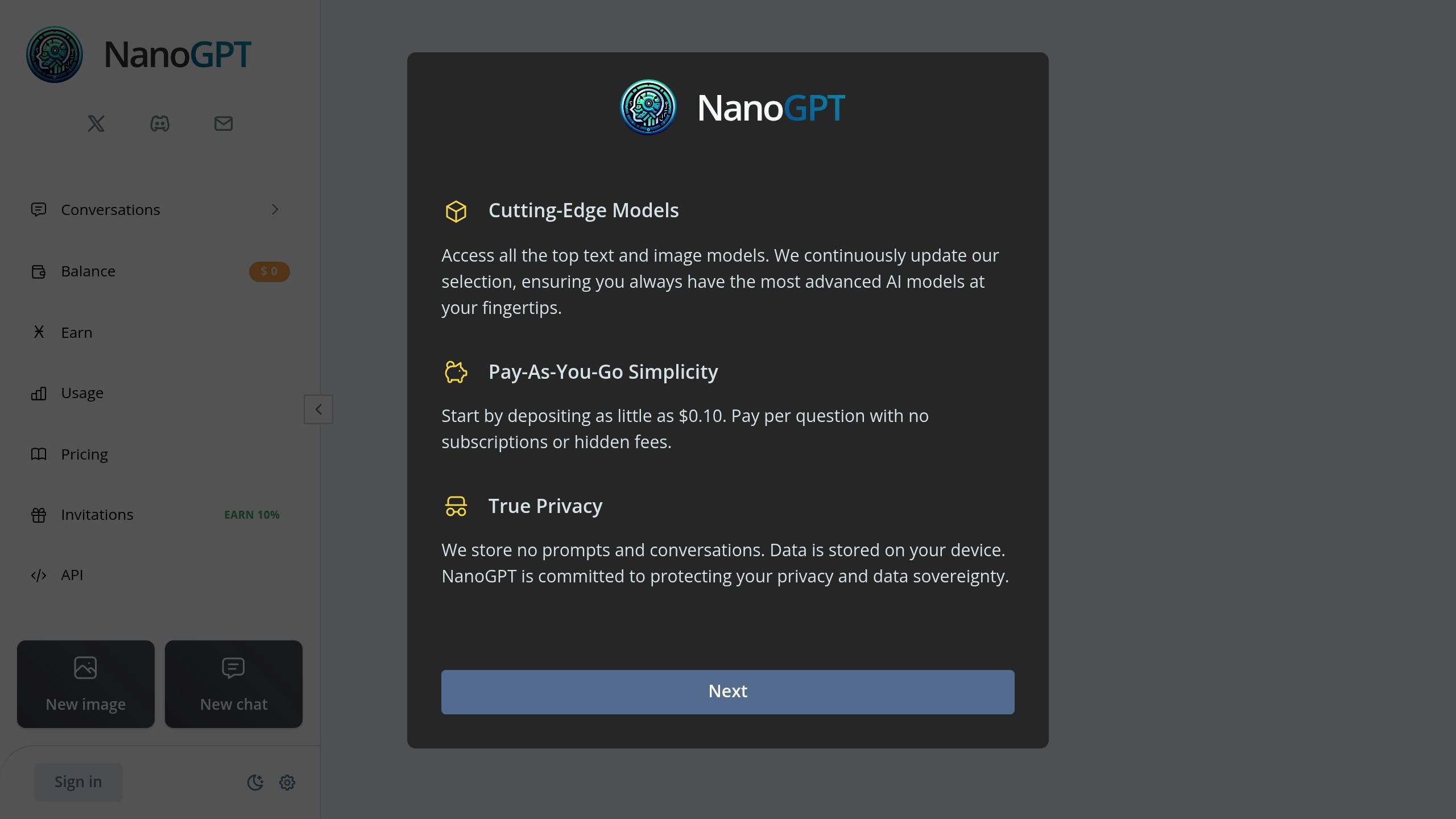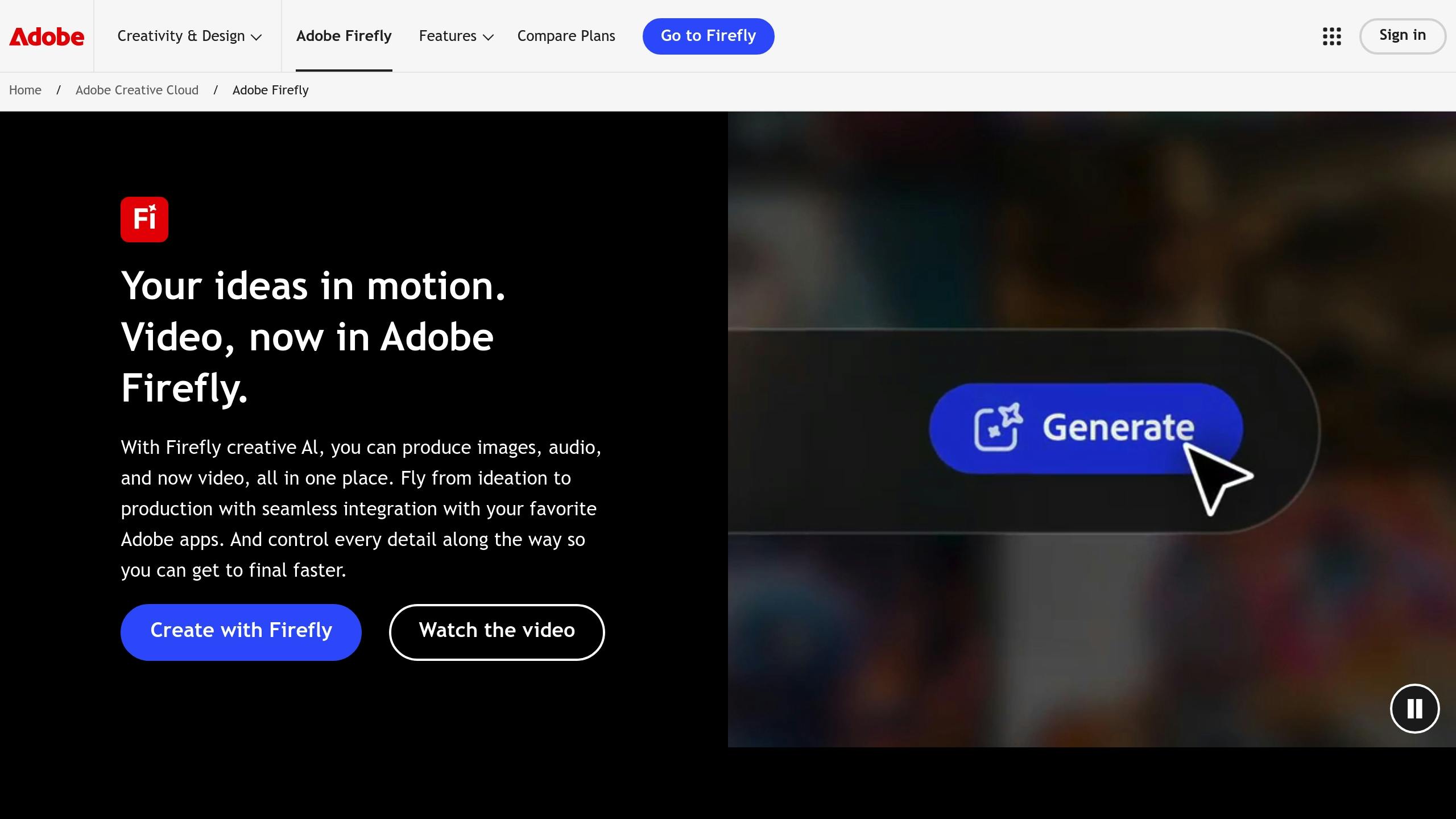Feb 13, 2025
Worried about privacy while using AI image generators? You're not alone. Many tools store user data, risking breaches and misuse. But some prioritize local processing, encryption, and user control to safeguard your data. Here's a quick look at the best options:
| Tool | Data Storage | Processing Type | User Control | Cost |
|---|---|---|---|---|
| AnonAI | Local | Local | Full | $50/month |
| NanoGPT | Local | Local | Full | $0.10/use |
| Adobe Firefly | Cloud | Hybrid | Moderate | $54.99/month |
| Leonardo.ai | Local | Local | Adjustable | $10/month |
| Imagen 2 | Cloud | Cloud | Limited | Not public |
| Ideogram | Local | Local | Full | $16/month |
| Stable Diffusion | Local | Local | Full | Hardware cost |
If privacy is your top concern, Stable Diffusion (Self-Hosted) offers unmatched control. For ease of use, AnonAI and NanoGPT are great options. Dive into the article for detailed reviews and recommendations.
AI image generation brings a range of privacy risks that users should be aware of. Beyond potential data breaches, these systems can infer sensitive details, like health conditions or political beliefs, based on user inputs [8]. Research has also shown that some models can replicate exact images from their training data [11].
AI image generators can process and interpret sensitive information in ways users might not expect. For instance, when you submit prompts or upload images, these systems could infer:
There’s also the risk of legal issues. AI-generated content might unintentionally infringe on copyrighted material, leaving users open to legal disputes [2].
The misuse of biometric data is another concern. For example, Lensa AI was reported to create explicit images from user-uploaded, fully clothed photos [5]. Deepfake technology further complicates this issue by making it possible to steal identities through highly realistic fake profiles [6].
| Privacy Risk Category | Potential Consequences |
|---|---|
| Data Storage | Unauthorized access to personal images |
| Training Data | Reproduction of private content |
| Model Inference | Exposure of sensitive attributes |
| Copyright Issues | Legal liability |
The tools we’ve reviewed tackle these challenges with strong privacy measures. Below, we’ll explore how our top recommendations address these concerns.
To find the most privacy-focused AI image generators, we created an evaluation framework centered on key privacy and security features. The goal was to highlight tools that give users control over their data while being transparent about their practices.
We focused on addressing privacy risks like data exposure and third-party vulnerabilities. Key factors included:
For example, NanoGPT, which uses device-based storage, performed well in this category.
We assessed encryption standards, audit practices, and protections against cyberattacks like DDoS. These features help prevent biometric data misuse.
| Security Feature | Evaluation Criteria | Impact on Rating |
|---|---|---|
| Encryption | Use of AES-256 or similar | High Priority |
| Authentication | Optional account creation | Medium Priority |
| Third-party Sharing | Minimal data exchange | High Priority |
We gave preference to tools offering users control over their data and clear policies. Features that stood out included:
Tools compliant with GDPR or CCPA and those with ISO 27001 certification were rated more favorably.
Anonymous access and tools requiring minimal personal data received higher scores.
We reviewed how tools handle third-party services by evaluating:

AnonAI is an AI image generator designed with privacy as its top priority. By processing all data directly on users' devices, it eliminates the need for cloud storage. This makes it an ideal choice for creators who want full control over their data.
AnonAI takes privacy seriously by offering:
This local-first approach minimizes risks of data exposure and aligns with a strong focus on user privacy.
AnonAI uses open-source AI models to create a wide range of images:
| Feature | Details |
|---|---|
| Styles | From digital art to realistic photos |
| Processing Speed | Instant results on supported hardware |
| Format Options | Multiple export formats available |
To run AnonAI effectively, hardware plays a big role:
The Pro plan starts at $50 per month, offering more advanced features and higher usage limits.
AnonAI ensures data safety with:
While the hardware demands may be steep, they align with the goal of keeping data entirely under the user's control. This makes it a strong option for those prioritizing privacy.

NanoGPT offers a flexible pay-as-you-go system for AI image generation, all handled through local processing. Unlike AnonAI's subscription-based approach, NanoGPT requires minimal personal information and supports multiple models like Stable Diffusion and Dall-E.
NanoGPT is designed with privacy in mind:
NanoGPT combines several AI models to deliver diverse image generation options:
| Feature | Details |
|---|---|
| Payment Structure | Starts at $0.10 per use |
To run NanoGPT efficiently, your system should meet these specs:
NanoGPT’s pricing is simple and transparent:
This model eliminates the need for recurring subscriptions, which often require storing personal information.
NanoGPT takes several steps to safeguard user data:
By relying on local processing, NanoGPT reduces the risks associated with biometric data and ensures greater control over user information.
Local processing comes with a few trade-offs. It requires powerful hardware, and image generation may take longer compared to cloud-based solutions. Additionally, credits in guest mode are lost if the browser cache is cleared.
This local-first approach contrasts with Adobe Firefly’s cloud-based processing (discussed next), giving users full control over their data.

Adobe Firefly blends creative tools with enterprise-level security using a mix of local and cloud-based processing. This setup places Firefly between NanoGPT's local-only model and Leonardo.ai's cloud-focused approach (discussed next).
Firefly takes privacy seriously, offering several features to give users control over their data:
| Feature | Details |
|---|---|
| Training Data | Adobe Stock, licensed content, and public domain works [2] |
| Processing Options | Combines local and cloud-based methods [2] |
| Output & Licensing | Generates images, vectors, and designs with commercial licensing [13][10] |
Firefly's privacy-first design makes it ideal for industries requiring secure workflows:
Firefly's pricing reflects its focus on privacy and enterprise needs:
A survey found that 90% of beta users felt Firefly improved their creative process without compromising privacy [5].
While Firefly offers a strong balance of features, it does have some drawbacks:
Adobe Firefly strikes a balance between local and cloud-based systems, making it a solid choice for enterprises that require both creativity and security.

With over 6 million users and a 4.5/5 rating for its privacy measures [12], Leonardo.ai stands out for its focus on local data processing and enterprise-level security. Unlike Adobe Firefly's hybrid cloud model, Leonardo.ai processes data directly on your device while adhering to ISO 27001-certified protection standards.
Leonardo.ai ensures user privacy with a range of safeguards:
These features mitigate risks tied to model inference by keeping sensitive processes isolated:
| Feature | How It Works | Why It Helps |
|---|---|---|
| Content Safety | Content filters, watermarking | Reduces risk of misuse |
| Data Control | Adjustable retention, privacy mode | Empowers users to manage data |
Leonardo.ai emphasizes transparency and user trust through:
For businesses, Leonardo.ai offers options to meet regional compliance requirements and strengthen security:
Paid plans begin at $10/month, offering added security features [12].
While local processing mirrors the setup demands of platforms like AnonAI, Leonardo.ai leans more toward enterprise needs. Some advanced capabilities may require technical expertise to configure.
Leonardo.ai strikes a solid balance between privacy and functionality, making it an excellent choice for users who value control over their data while still exploring creative possibilities.

Imagen 2 by Google takes a strong stance on privacy and security, offering cloud-based protections through advanced encryption and AI-driven content safeguards. Currently, access to Imagen 2 is limited as it undergoes safety evaluations, reflecting Google's focus on responsible AI practices.
Imagen 2 ensures secure data management with features like:
| Feature | How It Works | Privacy Advantage |
|---|---|---|
| Data Storage | User prompts are not stored | Reduces risk of data exposure |
| Content Filtering | AI moderation prevents misuse | Blocks harmful or unsafe outputs |
| Watermarking | Digital signatures are invisible | Helps identify AI-created content |
The platform empowers users with options to:
There are a few things to keep in mind:
Future updates aim to include on-device processing and better anonymization of user prompts.

Ideogram offers a device-focused solution for image generation, bypassing cloud servers entirely. Unlike Imagen 2's cloud-based protections, all processing happens locally on your device, ensuring greater control over your data[1][2].
Ideogram puts users in charge of their creations, granting full intellectual property rights for all generated images[4]. Key features include:
While local processing enhances privacy, it comes with certain trade-offs, similar to AnonAI and NanoGPT:
Ideogram sticks to its local-first approach, even for its paid plans. The free tier allows up to 100 image generations daily. For $16/month (or $168 annually), the Pro plan provides additional privacy tools and features[2].
To ensure safe and ethical use, Ideogram incorporates content filtering, bias detection, and mandatory security audits as part of its protection measures[3][5].
Self-hosting Stable Diffusion gives you full control over your data by running the model directly on your local machine. Unlike cloud-based options like Imagen 2, this open-source solution ensures complete privacy, as no data leaves your device[1].
Running Stable Diffusion locally provides unmatched privacy by keeping everything on your system, with no third-party involvement:
To run Stable Diffusion on your system, here’s what you’ll need:
| Component | Minimum Requirement |
|---|---|
| GPU | NVIDIA GPU with 6GB+ VRAM |
| System RAM | 16GB |
| Storage | 20GB free space |
| GPU Support | CUDA-compatible |
To ensure a secure setup, consider these steps:
Performance largely depends on your GPU. Running the model locally allows seamless integration with editing tools and customized workflows, giving you more control over the quality and process.
While self-hosting removes subscription costs, you’ll need compatible hardware to get started[2].
The self-hosted setup supports a wide range of integrations to fit your workflow:
Before diving in, keep these challenges in mind:
For those who prioritize privacy - like organizations handling sensitive data or privacy-conscious individuals - these trade-offs are often worth it for the control and security self-hosting provides[5].
Here's a side-by-side look at the main differences between these tools based on privacy, data handling, and rights:
| Feature | AnonAI | NanoGPT | Adobe Firefly | Leonardo.ai | Imagen 2 | Ideogram | Stable Diffusion (Self-hosted) |
|---|---|---|---|---|---|---|---|
| Privacy & Security | |||||||
| Data Storage Location | Local | Local | Cloud | Cloud | Cloud | Cloud | Local |
| End-to-End Encryption | Yes | Yes | Yes | Partial | Yes | No | Configurable |
| Data Retention Period | None | None | 90 days | 30 days | 60 days | 45 days | User-defined |
| User Data Control | Full | Full | Limited | Moderate | Limited | Limited | Full |
| Offline Capability | Yes | Yes | No | No | No | No | Yes |
| 2FA Support | Yes | Optional | Yes | Yes | Yes | No | Configurable |
| API Security | High | High | Enterprise-grade | High | Enterprise-grade | Moderate | Customizable |
| Regular Security Audits | Yes | Yes | Yes | Quarterly | Yes | No | Configurable |
| GDPR Compliance | Yes | Yes | Yes | Yes | Yes | Partial | Configurable |
| Data Collection | |||||||
| Prompt Collection | No | Optional | Yes | Yes | Yes | Yes | No |
| Image Storage | No | Optional | Yes | Yes | Yes | Yes | Local only |
| Usage Analytics | No | Minimal | Yes | Yes | Yes | Yes | No |
| Model Training Use | No | No | Yes | Optional | Yes | Yes | No |
| Rights & Ownership | |||||||
| Image Ownership | User | User | Shared | User | Limited | User | Full user |
| Commercial Use | Yes | Yes | Licensed | Yes | Limited | Yes | Yes |
| Export Options | All formats | Limited | Adobe formats | Multiple | Limited | Standard | Unrestricted |
This table emphasizes the differences in privacy approaches, particularly between tools that rely on local storage versus those using cloud-based systems.
After comparing privacy features and data handling practices, here are some tailored suggestions:
Here's a quick summary:
| User Need | Recommended Tool | Best For |
|---|---|---|
| Complete Data Control | Stable Diffusion | Technical users & organizations |
| Daily Creative Work | AnonAI | Individual creators |
| Commercial Projects | Adobe Firefly | Professional teams |
| Batch Processing | Leonardo.ai | Business users |